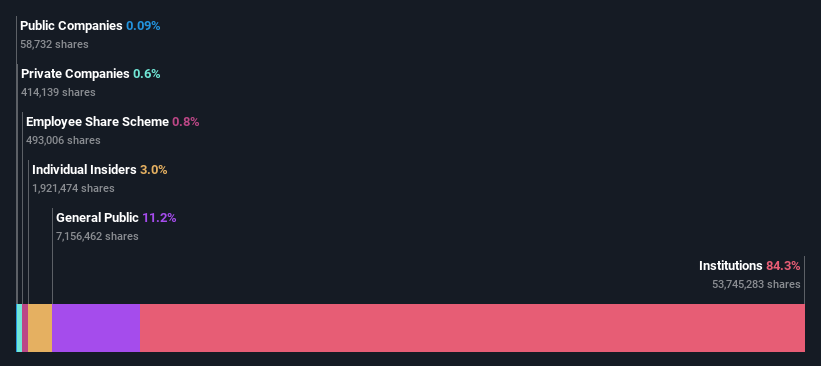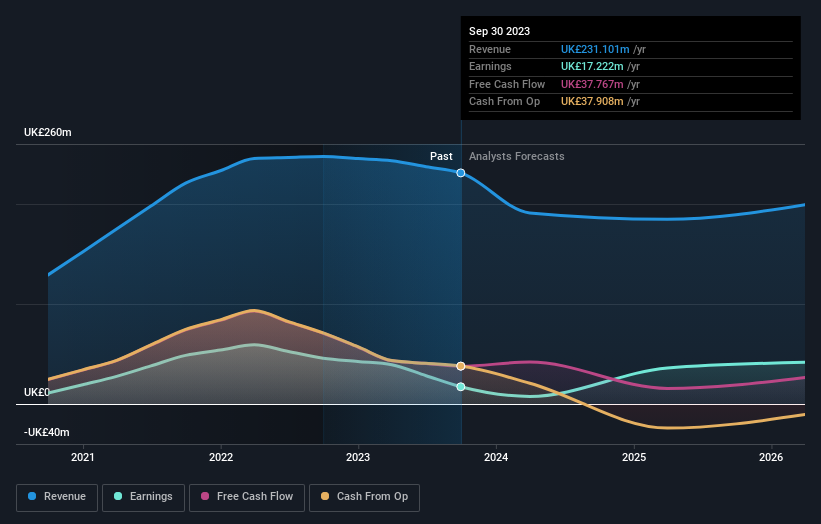Liontrust Asset Management PLC (LON:LIO) is a favorite amongst institutional investors who own 84%
Key Insights
Institutions' substantial holdings in Liontrust Asset Management implies that they have significant influence over the company's share price
A total of 16 investors have a majority stake in the company with 50% ownership
Insiders have bought recently
Every investor in Liontrust Asset Management PLC (LON:LIO) should be aware of the most powerful shareholder groups. And the group that holds the biggest piece of the pie are institutions with 84% ownership. That is, the group stands to benefit the most if the stock rises (or lose the most if there is a downturn).
Given the vast amount of money and research capacities at their disposal, institutional ownership tends to carry a lot of weight, especially with individual investors. Hence, having a considerable amount of institutional money invested in a company is often regarded as a desirable trait.
Let's delve deeper into each type of owner of Liontrust Asset Management, beginning with the chart below.
View our latest analysis for Liontrust Asset Management

What Does The Institutional Ownership Tell Us About Liontrust Asset Management?
Institutional investors commonly compare their own returns to the returns of a commonly followed index. So they generally do consider buying larger companies that are included in the relevant benchmark index.
As you can see, institutional investors have a fair amount of stake in Liontrust Asset Management. This suggests some credibility amongst professional investors. But we can't rely on that fact alone since institutions make bad investments sometimes, just like everyone does. When multiple institutions own a stock, there's always a risk that they are in a 'crowded trade'. When such a trade goes wrong, multiple parties may compete to sell stock fast. This risk is higher in a company without a history of growth. You can see Liontrust Asset Management's historic earnings and revenue below, but keep in mind there's always more to the story.

Investors should note that institutions actually own more than half the company, so they can collectively wield significant power. Liontrust Asset Management is not owned by hedge funds. Our data shows that Martin Currie Ltd. is the largest shareholder with 4.8% of shares outstanding. With 4.7% and 4.7% of the shares outstanding respectively, Sanford DeLand Asset Management Limited and The Vanguard Group, Inc. are the second and third largest shareholders. Additionally, the company's CEO John Ions directly holds 1.4% of the total shares outstanding.
A closer look at our ownership figures suggests that the top 16 shareholders have a combined ownership of 50% implying that no single shareholder has a majority.
While studying institutional ownership for a company can add value to your research, it is also a good practice to research analyst recommendations to get a deeper understand of a stock's expected performance. There are a reasonable number of analysts covering the stock, so it might be useful to find out their aggregate view on the future.
Insider Ownership Of Liontrust Asset Management
The definition of company insiders can be subjective and does vary between jurisdictions. Our data reflects individual insiders, capturing board members at the very least. Management ultimately answers to the board. However, it is not uncommon for managers to be executive board members, especially if they are a founder or the CEO.
Most consider insider ownership a positive because it can indicate the board is well aligned with other shareholders. However, on some occasions too much power is concentrated within this group.
We can report that insiders do own shares in Liontrust Asset Management PLC. As individuals, the insiders collectively own UK£11m worth of the UK£364m company. Some would say this shows alignment of interests between shareholders and the board. But it might be worth checking if those insiders have been selling.
General Public Ownership
With a 11% ownership, the general public, mostly comprising of individual investors, have some degree of sway over Liontrust Asset Management. This size of ownership, while considerable, may not be enough to change company policy if the decision is not in sync with other large shareholders.
Next Steps:
It's always worth thinking about the different groups who own shares in a company. But to understand Liontrust Asset Management better, we need to consider many other factors. For example, we've discovered 3 warning signs for Liontrust Asset Management (1 is a bit concerning!) that you should be aware of before investing here.
Ultimately the future is most important. You can access this free report on analyst forecasts for the company.
NB: Figures in this article are calculated using data from the last twelve months, which refer to the 12-month period ending on the last date of the month the financial statement is dated. This may not be consistent with full year annual report figures.
Have feedback on this article? Concerned about the content? Get in touch with us directly. Alternatively, email editorial-team (at) simplywallst.com.
This article by Simply Wall St is general in nature. We provide commentary based on historical data and analyst forecasts only using an unbiased methodology and our articles are not intended to be financial advice. It does not constitute a recommendation to buy or sell any stock, and does not take account of your objectives, or your financial situation. We aim to bring you long-term focused analysis driven by fundamental data. Note that our analysis may not factor in the latest price-sensitive company announcements or qualitative material. Simply Wall St has no position in any stocks mentioned.
